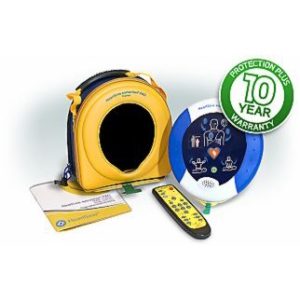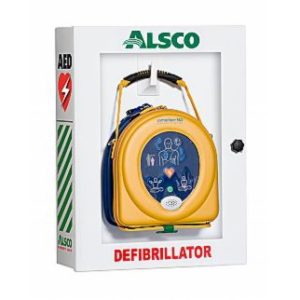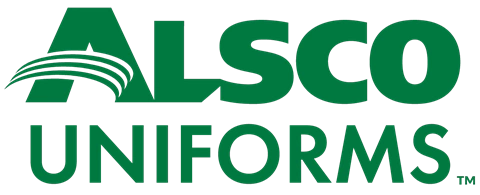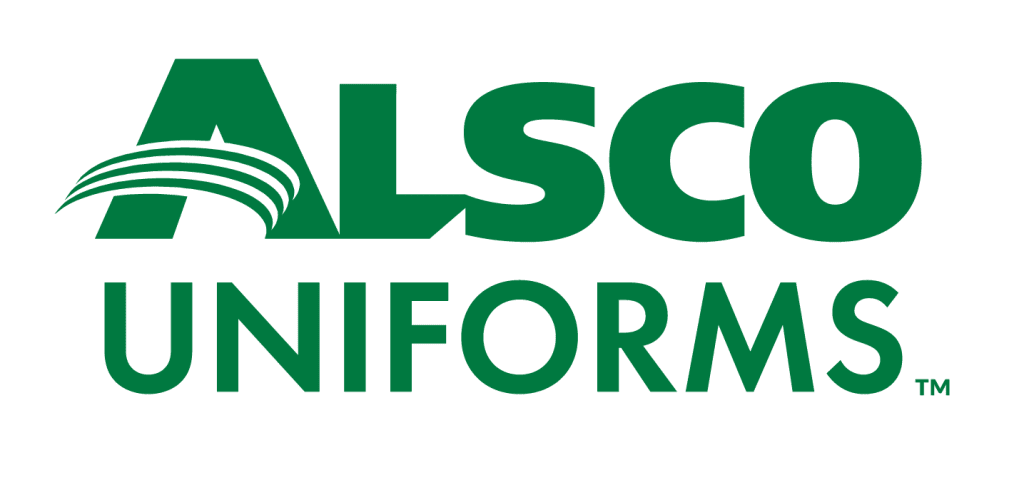There are many misconceptions about AEDs on mainstream media.
You are likely familiar with the medic scene in movies or sitcoms where a defibrillator is pressed down on the victim and a shock is administered while the victim’s body convulses, later you hear- “clear!”
The reality is quite different.
When someone suffers abnormal heart behaviour, AEDs work to restore normal heart functions.
Very few will ever witness these devices restarting a stopped heart.
This does not mean AEDs are irrelevant! Did you know that when it comes to cardiac arrest the risk is higher at the workplace?
The process is less powerful (and could last longer) than what you see on television.
What Is an AED?

An AED or an Automated External Defibrillator is a portable electronic device that diagnoses sudden cardiac arrest symptoms and helps in treatment.
This occurs through a process known as defibrillation. (sending electrical shock into a victim’s body to help restore effective rhythm).
AEDs are sophisticated, easy to use and a must-have in your workplace and other public buildings.
An AED kit will contain the following:
- Face shield or mask that creates a barrier between the victim and first aider during a rescue
- Nitrile rubber gloves.
- Towel to wipe moisture from the chest area
- Razor (for patients with hairy chests)
- Trauma shears meant to cut through clothing and expose the chest area
Benefits of Having an AED
There are numerous benefits of keeping an AED in the workplace:
- You can boost the survival rate of a victim in dire condition with a defibrillator by 60% according to the Occupational and Safety Health Administration.
- Defibrillators help save on time as they can be used before emergency medical service personnel arrive. This improves the likelihood of survival for the victim.
- They are easy to use with the proper training. Modern defibrillators won’t allow you to shock a victim with a steady heartbeat. This means you reduce the risk of causing more harm to the victim.
Should You Take an AED First Aid Course?
One in 21 adults lives with heart disease in New Zealand. It is the leading cause of death with 33% of fatalities attributed to it annually.
When a heart stops beating, every second is valuable. Reading up on techniques that can help you save a life is a good first step.
Did you that heart attacks are the leading cause of accidents around the world?
Your knowledge needs to extend into practical abilities as well. Operating an AED should be as familiar to you as knowing how to use your phone.
This means you are better placed to help your colleague or passerby. You can and should seek out professional assistance in case of an emergency, but be able to provide help as you wait.
You can provide training on AEDs, certified first responder (CPR), basic life support (BLS) and first aid techniques in your workplace.
You can take note of this acronym to help you in emergency situations:
D- danger?
R- response?
S- send for help
A- open the airway
B- breathing normally?
C- start giving CPR
D- attach the defibrillator
This information is not a substitute for an actual course, but rather tips to add to your first aid knowledge. These are basic steps that can be administered to adults, children and infants.
Are There Any Risks Involved?
Metal conducts electricity very fast. This can cause harm to the victim who needs AED treatment.
You need to be cautious of any item of clothing that has metal underwire such as bras that can cause interference.
Be sure to also look for body piercings or any metal jewellery in areas where the AED pads need to be placed.
In most cases, care providers suggest placing the pads inches away from the metal to perform AED treatment.
It is also assumed that the electrical charge released is high enough to be deadly. This is not the case.
There is no recorded history of a defibrillator causing harm to bystanders or persons administering help to a victim. It is still wise to make sure everyone is clear of the victim when the shock is given.
Can You Be Sued for Using AED on a Victim?
Again, there are no recorded cases of a person being injured by using an AED. if you ever find yourself needing to use AED on a victim, you are unlikely to cause any harm and not land yourself a lawsuit.
Ever heard of Good Samaritan Laws? They work at protecting a responder who acts in good faith in an attempt to save another.
Can AED Pads Be Used on a Wet Surface?
Defibrillation is meant to be performed on a dry surface. This means clearing the area surrounding the victim. Bystanders should create as much space as possible away from the wet surface.
If the victim cannot be moved to a dry surface immediately, caregivers must avoid direct contact with them while using AEDs.
Are AED Pads Reusable?
No. AED pads are one-time use only. Make sure you dispose of them right after. They are not toxic and can be disposed of in a standard trash can.
You need to make sure you replace them as soon as possible so that you are prepared for emergencies at all times.
Where Should AEDs Be Stored?
Defibrillators should be easily accessible and highly visible. The casing is often brightly coloured and mounted on walls near the entrance of a building.
Should You Buy or Rent an AED?


If you want the latest technology and the latest equipment you need a quality AED kit. Did you know you can deduct the rental fee for an AED as an operating expense?
Keeping your employees safe and well informed is important for any business. The age-old saying better safe than sorry still carries weight when it comes to safety practices.
With Alsco’s defibrillators you receive:
- One inclusive annual fee, making it an affordable payment plan.
- A simplified and easy to use AED kit.
- Regular checks, maintenance and/or replacement every three months.
Don’t risk a life, contact Alsco now and get an AED installed within your workplace.






